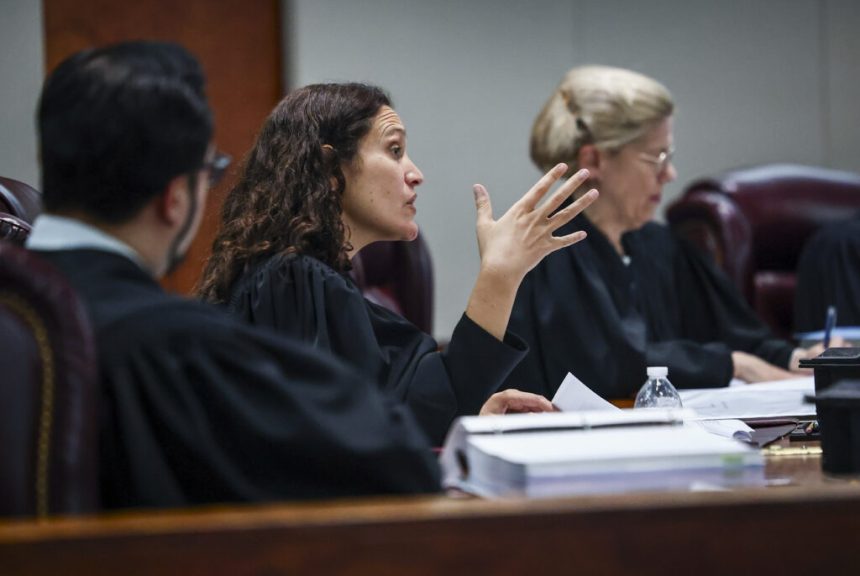A majority of the New Jersey Supreme Court denied a lifer’s bid for release, with one dissenting justice warning of a risk of prolonged incarceration. (Dana DiFilippo | New Jersey Monitor)
A convicted killer incarcerated for more than half a century lost his bid for freedom Monday after the New Jersey Supreme Court rejected his argument that his continued incarceration is unconstitutional under the state’s shifting parole law.
Fred Krug, 78, challenged the state parole board’s 2023 denial of his request for release, citing state and federal constitutional protections — known as ex post facto rights — that prohibit authorities from prolonging punishment by applying new laws to old offenses.
But the state’s top court, in a 6-1 decision, ruled that while state legislators widened parole access in 1979, they restricted it again in 1997 — and the 1997 restrictions were similar to the 1948 parole law that was in place when Krug committed his offenses.
“The U.S. Supreme Court has explained that the ex post facto analysis is concerned ‘solely with whether a statute assigns more disadvantageous criminal or penal consequences to an act than did the law in place when the act occurred.’ That remains true when it comes to changes in parole laws,” Justice Rachel Wainer Apter wrote for the majority. “There is simply no ex post facto problem in retroactively applying to a person the same parole regime that existed at the time he committed his offense.”
The state Office of the Public Defender represented Krug. Joseph J. Russo, an assistant public defender who heads the office’s parole revocation and resentencing unit, called Monday’s decision disappointing.
“For nearly two decades, Mr. Krug’s parole eligibility was governed by the 1979 Parole Act. The majority’s ruling disregards well-established constitutional protections and allows the Parole Board to change the rules long after individuals have relied on them to guide their conduct and plan for release,” Russo said in a statement.
Krug was convicted in 1974 and sentenced to life imprisonment for killing a schoolteacher in East Brunswick, assaulting another woman, and punching a police officer in 1973, all while he was on parole for previous convictions of rape, aggravated assault, and larceny, among other offenses, according to the ruling.
He applied five times for parole between 1994 and 2022, with the board denying him every time, the decision notes. In 2023, the board cited multiple reasons for their denial, including finding a likelihood that he would commit a new crime if paroled.
After his fifth rejection, he appealed, pinning his plea to legislative changes made in 1979 that created a presumption of release for parole applicants.
Before 1979, people angling to get out of New Jersey’s prisons were bound by the Parole Act of 1948. That act allowed the board to review “all existing available records” in determining whether to grant or deny parole.
In 1979, lawmakers repealed the 1948 law and replaced it with a law that largely barred the board from denying parole unless it had “new information” that justified continued confinement. Lawmakers tweaked that law again in 1997, removing the new information requirement and allowing the board to again consider an applicant’s entire record.
Krug had argued that the 1997 amendments subjected him to harsher penalties than he faced under the 1979 law, making his denial unconstitutional under ex post facto protections. He criticized the board’s “shifting position” relating to the many legislative changes, saying it “essentially asserts that it gets to pick and choose which Parole Act applies to a (pre-1997) inmate based on whichever Act makes it easiest to deny parole.”
Justice Michael Noriega, the lone dissenter, objected to the parole board resurrecting the repealed 1948 law to justify Krug’s continued incarceration, saying the board “creates a legal fiction that the 1979 Act never existed.”
The 1979 law was enacted with retroactive effect and set the expectations under which Krug served his sentence and sought parole, Noriega wrote.
“Then, in 1997, the State enacted new parole provisions that imposed more restrictive conditions that created a substantial risk of prolonged incarceration. In 2022, the Parole Board applied those stricter standards and denied Krug parole. The Ex Post Facto Clause was specifically designed to forbid and prevent such maneuvering,” Noriega wrote.
The court’s majority disagreed.
“Because the law at the time of Krug’s offenses permitted the Board to consider the same ‘all existing’ information it may now consider, we hold that retroactive application of the 1997 amendment to Krug created no risk of additional punishment,” Wainer Apter wrote.
Wainer Apter noted, though, that the majority decision does not address “whether the facts of this case, or any case involving a change in law that conferred a benefit on an inmate for many years, and then subsequently repealed that benefit, could implicate due process or fundamental fairness concerns.”
Monday’s ruling comes after multiple reports in recent years have dinged the parole board for its low release rates. The board has for years freed less than half of parole-eligible applicants, prompting calls for reform.
SUBSCRIBE: GET THE MORNING HEADLINES DELIVERED TO YOUR INBOX









